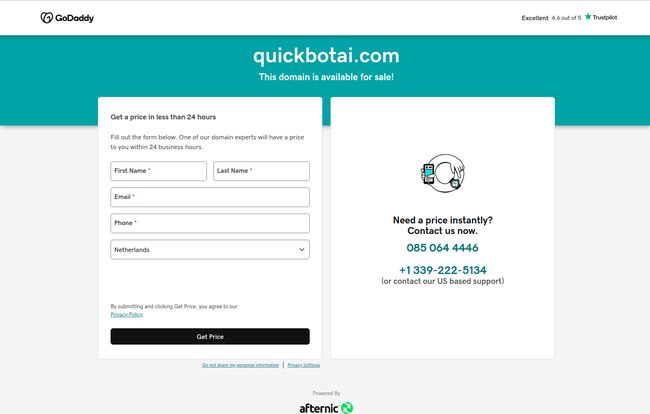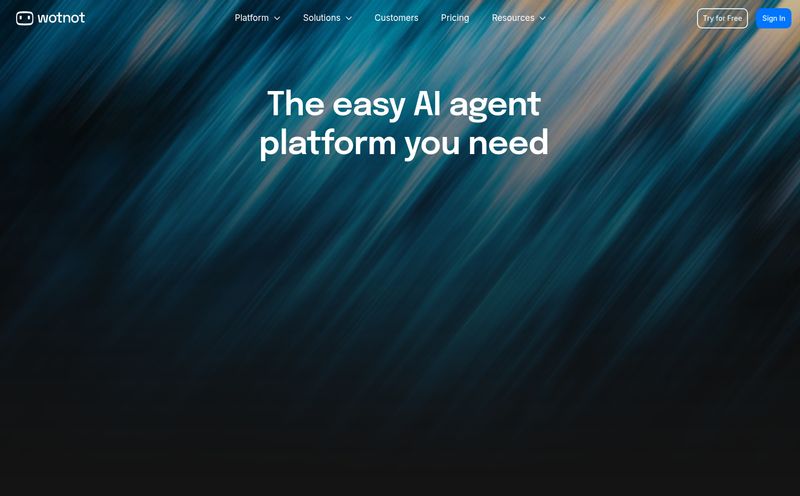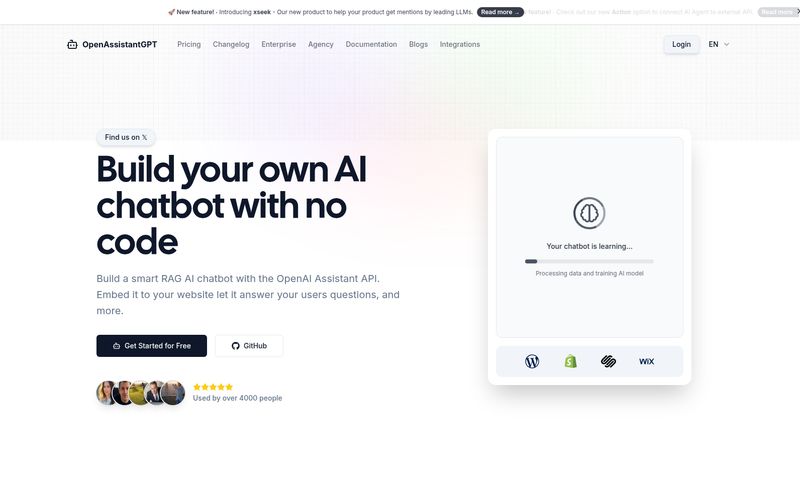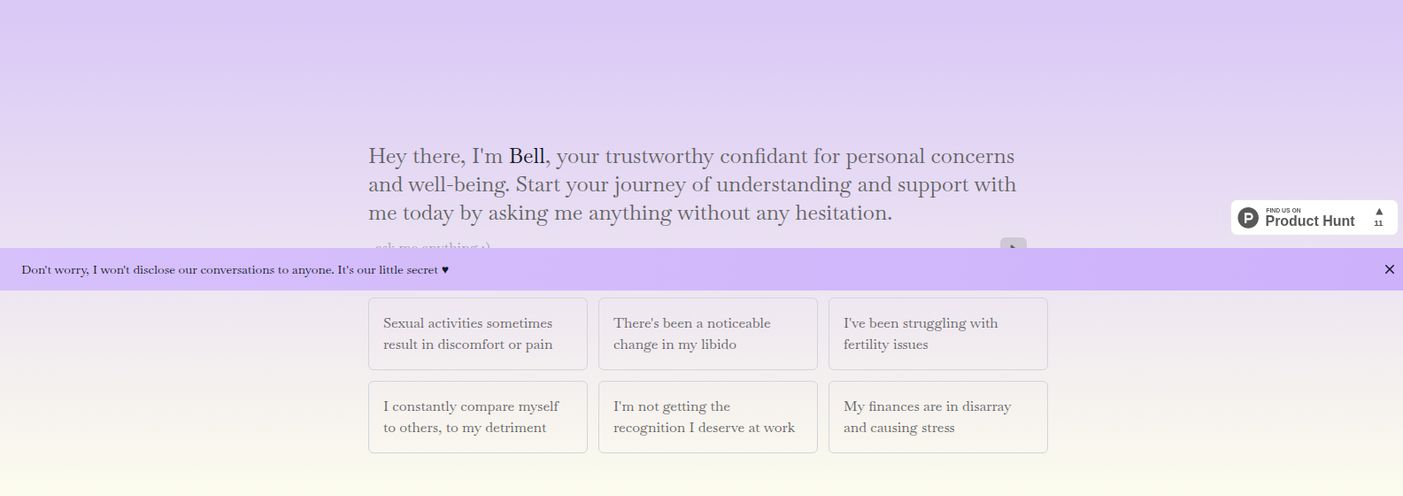As someone who’s been neck-deep in the SEO and digital marketing world for years, I've seen my fair share of tools. Some are game-changers, some are duds, and some... well, some become digital ghost stories. And that, my friends, seems to be the story of Quickbot AI.
I stumbled across its specs a while back and my interest was immediately piqued. The promises were everything small to medium-sized businesses are screaming for right now. An AI chatbot, powered by the mighty OpenAI, that you could train on your own data. No coding skills needed. Sounds pretty standard so far, right? But here were the kickers: a one-time payment and the ability to host it on your own VPS.
In a world drowning in monthly subscriptions, the idea of a one-and-done payment for a powerful tool felt like a breath of fresh air. And self-hosting? For anyone remotely concerned about data privacy (which should be everyone), that’s the golden ticket. But as with all things that sound too good to be true, there's a twist in this tale.
What Was the Big Idea Behind Quickbot AI?
Before we get to the spooky part, let's appreciate the concept. Quickbot AI was designed to be a stand-alone piece of software that let you build a powerful customer support chatbot. The core engine was OpenAI's technology, which we all know can be incredibly powerful. The goal was to democratize this tech, taking it out of the hands of just developers and putting it into the hands of business owners, marketers, and support teams.
You could feed it your own documents, website content, or FAQs, and poof—an intelligent bot that actually knows your business. No more generic, frustrating chatbot experiences that end with "I'm sorry, I don't understand." The dream, right?
Taking Back Control of Your Data
This was the biggest draw for me. Most chatbot solutions are SaaS platforms. You build your bot on their site, and your data (and your customers' data) lives on their servers. While most are secure, you're still placing a huge amount of trust in a third party. Quickbot AI’s proposition was different. You’d get the source code and deploy it on your own Virtual Private Server (VPS). It’s like the difference between renting an apartment and owning your own house. You hold the keys. You control who comes in and out. For businesses in healthcare, finance, or any field with sensitive data, this isn't just a feature; it's a necessity.
Ditching the Dreaded Subscription Model
I have what I call 'subscription fatigue'. I bet you do too. Every service, every tool, every piece of software wants a piece of your monthly budget. Quickbot AI's one-time payment model was a direct rebellion against this. Pay once, get lifetime updates. It's an old-school software model that you rarely see anymore, and frankly, I miss it. It simplifies budgeting and feels more like a genuine purchase rather than a rental.
A Look at the Promised Features and Pricing
On paper, the feature set was solid. Customizing the bot’s personality, tweaking the look of the chat widget, and a simple setup process. All the good stuff. The pricing structure was tiered, which is pretty standard. It looked something like this:
| Plan | Price (One-Time) | Key Features |
|---|---|---|
| Small | £399 | Source code, 1 bot, 6 months of support. |
| Standard | £699 | Source code, deployment on your VPS, 12 months of bug updates. |
| Premium | £999 | Everything in Standard + training on website data, 12 months support, one channel deployment. |
The pricing seemed reasonable for a lifetime license, especialy when you compare it to the ongoing costs of many competitors. But this is where our story takes a turn. When I went to check out the site for a fresh look... I was greeted by this.

Visit Quickbot AI
So, What on Earth Happened?
Yep. The `quickbotai.com` domain is for sale. Parked on GoDaddy, waiting for a buyer. This is the online equivalent of showing up to a restaurant you've heard great things about, only to find the windows boarded up and a "For Lease" sign on the door. It’s a bit of a digital ghost town.
What does this mean? It could be anything. Maybe the founders ran out of funding. Perhaps the challenge of providing "lifetime updates" for a one-time fee, especially when relying on a constantly changing third-party API like OpenAI's, proved to be an unsustainable business model. It could even be something as simple and tragically common as the founder forgetting to renew the domain. We might never know for sure, but it serves as a powerful reminder of the volatility of the tech world. The AI gold rush is creating incredible tools, but it's also leaving some promising projects by the wayside.
Even Great Ideas Have Downsides
Looking back at the proposition, even if the site were live, there were some potential bumps in the road. Let's be honest about them.
First, the whole VPS requirement. While it's a huge pro for security, it's a con for accessibility. Not everyone knows how to spin up and manage a VPS. It adds a layer of technical complexity and a separate cost that less tech-savvy users might balk at. It's a hurdle, no question.
Then there's the tiered support. Six months of support on the entry-level plan is... not a lot. Especially for a tool that involves a bit of a technical setup. And the real eyebrow-raiser for me was the Premium plan's limitation: one channel deployment. For £999, you'd want the ability to deploy your bot across multiple platforms—your website, Facebook Messenger, WhatsApp, etc. Limiting it to one channel feels oddly restrictive for a top-tier plan.
What We Can Learn From a Digital Ghost
The story of Quickbot AI, whether it's a temporary blip or a permanent end, is a lesson. It highlights a genuine hunger in the market for AI tools that are secure, affordable, and free from the endless cycle of subscriptions. The idea was brilliant.
However, it also serves as a cautionary tale. When you're evaluating a new tool, especially from a new company, you have to look beyond the promises. Is the business model sustainable? What happens if the company disappears? For tools you self-host, you might still have the software, but you'll be without support or those crucial updates. It’s a risk/reward calculation every business has to make.
Frequently Asked Questions about Quickbot AI
- What was Quickbot AI supposed to be?
- Quickbot AI was a planned software tool that would allow users to build custom AI chatbots using OpenAI's technology. Its main selling points were that it required no coding, had a one-time payment, and could be hosted on the user's own server (VPS) for enhanced security.
- Why was self-hosting such a key feature?
- Self-hosting on a VPS means all your business and customer data remains on a server you control. This is a massive advantage for data privacy and security, as you aren't relying on a third-party company's infrastructure.
- Is Quickbot AI still available?
- As of late 2023 / early 2024, the official domain name (quickbotai.com) is listed for sale, indicating the service is not currently active or available for purchase through its original website.
- Was the one-time payment model a good idea?
- For customers, a one-time payment is very attractive. For the company, however, it can be difficult to sustain, especially when the software relies on external services like the OpenAI API, which have ongoing costs and require continuous updates.
- Are there good alternatives to Quickbot AI?
- Absolutely. The AI chatbot space is huge. For those comfortable with a bit more tech, you can look at open-source frameworks like Botpress. For user-friendly, no-code SaaS platforms, tools like Voiceflow, Tidio, or Intercom offer powerful features, though they typically follow a monthly subscription model.
- What does it mean when a domain is 'for sale'?
- It means the previous owner has either intentionally listed it for purchase or failed to renew their ownership, allowing it to lapse and be claimed by a domain marketplace. In either case, it's no longer pointing to an active website from the original owner.
A Final Thought
So, we raise a glass to Quickbot AI. An idea that was maybe a bit ahead of its time, or perhaps just a victim of the harsh realities of the startup world. It represented a desire for something different—more control, fairer pricing, and genuine ownership. While this particular ship seems to have vanished into the fog, the ideals behind it are something I hope we see more of. The search for the perfect, secure, and user-owned AI assistant continues.
Reference and Sources
Domain Status Check: https://quickbotai.com/ (Accessed for this article, showing a 'For Sale' page via GoDaddy/Afternic).



